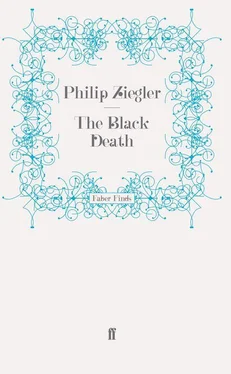When the plague came in the end it was not by way of Winchester but through the back door from Preston Stautney. It had been a mild, wet winter and Bartholomew Thomasyn was barely recognizable for mud when he staggered up the track that linked the two villages. He had married a girl from Blakwater and so was well known there but the friendly greetings died on the lips of the peasants as he stammered out his news. His wife was dead, he said, and their little daughter with her. At least six other villagers were dead or dying. With nothing left to hold him to his house, he had fled. Soon others would be following his example. The village was doomed and all who stayed there would perish. He had not slept for three days nor eaten for twenty-four hours. His father-in-law led him away to get some rest and the group of peasants that had clustered around broke up with scarcely a word.
That afternoon the reeve walked quietly around the village asking a few of the wiser or senior inhabitants to come to a meeting in the hall of the manor. The steward was away on his travels but the parson was going to be there. Roger, of course, was among those invited. The group duly assembled but, when they were all seated around the table, no one seemed to have any idea what to say or do. The parson should have taken the lead but he looked ill and half-asleep and contributed nothing to the discussion while the reeve muttered some prepared preamble about the need to do something urgently and then looked helplessly around for contributions.
In the end Roger spoke up. Everyone who knew anything about the plague, he said, agreed that it was fatal to have any contact with the victims. The village, therefore, must cut itself off. Travellers should be forbidden to use the road through the village; if they wanted to by-pass it through the fields then they were welcome to do so but they should come no closer. Above all the village must have nothing to do with Preston Stautney. If anyone from there tried to enter Blakwater, they must be turned away – by force if necessary. This was not uncharitable for, after all, there was nothing that could be done to help. Anyway, charity began at home. Their first duty was to their wives and children.
No one spoke up against Roger’s plan but one of the elder villeins stirred uneasily at the end of the table. What about Bartholomew Thomasyn, he asked; was he to be allowed to stay? ‘He must go,’ put in Roger quickly, before anyone else could speak. He knew as he spoke how harsh his words must sound to Bartholomew’s father-in-law who was also at the meeting but he thought of his wife and children and knew that he was right. The reeve would back him and he could over-persuade the other villeins but he was nervous lest the parson should oppose him and argue that it was their Christian duty to help the sick. He glanced down towards the end of the table but the parson had his head sunk in his hands and gave no sign even of listening to the discussion. Bartholomew’s father-in-law protested but without much conviction. To all of them the peril seemed too great to leave room for sentimentality.
Suddenly the parson lurched to his feet. The peasants fell silent and looked expectantly towards him but, instead of speaking, he turned away and staggered through the door. Was he overcome by anger at their lack of charity, wondered Roger nervously? They watched him totter down the path towards the manor gate, reeling from one side to the other and seeming every instant about to fall. ‘Parson had a bit too much to drink?’ speculated one of the villagers. As he spoke the parson pitched forward on his face, tried to drag himself to his feet, then fell forward again and lay still. In a few seconds Roger was at his side. His breath was coming with a heavy wheezing noise, his cheeks were so hot that Roger snatched away his hand in alarm as he touched them. They carried him to his house and pulled the clothes from his twitching, fevered body. Under both armpits and in his groin red boils were growing: still small but not so small that those who saw them could doubt that they were the dreaded plague buboes about which they had heard so much.
Without looking at each other, without a word, the villagers slipped from the parsonage and fled to their own houses. Against the immense peril of the plague they had no recourse save that of prayer. Yet now the sickness of the parson seemed to have cut them off even from that ultimate hope. If God first struck down His chosen servant how terrible must be His wrath against the others! For a few hours they skulked indoors, scarcely venturing even to look outside. Everywhere, it seemed, the poisoned breath of the plague must be awaiting them. It was almost dark before Roger pulled himself together and walked out into the silent lane. He went from house to house, calling to the inhabitants. No other case of the plague had yet occurred. At the parsonage the parson had dropped into a restless sleep. He tossed and turned but his fever had grown a little milder. Could it be that Blakwater would escape lightly, that God would content himself with this dire warning and now avert his wrath. There seemed at least a ray of hope.
This happened on a Monday. On Tuesday there was no new case and the villagers began to creep cautiously from their houses and to talk together in hushed voices. On Wednesday there was still no further outbreak. The parson’s buboes had swollen and were now inflamed and painful but he himself had recovered consciousness and showed no signs of imminent decease. In sharp reaction to their earlier despair a wave almost of euphoria overcame the villagers. Surely the danger of a worse outbreak must fast be passing? Most of the peasants went off to work in the fields and, generally, life was returning to normal. Seeing Bartholomew Thomasyn outside his father-in-law’s house Roger remembered his plan for sealing off the village. With the plague already inside, there was little point in such precautions.
Wednesday was cold but clear. Roger rose at his usual time, looked anxiously at his family and saw with relief that all were well. Another night safely passed: he walked outside into his garden. His aunt’s house was quiet and no smoke came from the fire. Odd, she was usually up before him. In sudden apprehension he ran to the door. As he approached he heard a low moaning from within. The old lady was sprawled in a heap on the ground; she must have been overcome on her way to seek help. Her face was haggard, her eyes sunken and blood-shot. Her swollen tongue protruded from dry, cracked lips. She was barely conscious but aware that Roger was beside her. ‘Water!’ she croaked, in a whisper that hardly reached her nephew’s ear, ‘Water!’ When a pot of water was brought, she drank it down greedily; she was unable to control the movements of her tongue and, in spite of Roger’s efforts, a lot of the water dribbled down her front on to the floor. When the pot was empty she fell back exhausted, breathing stertorously but apparently a little the better for her drink.
Roger left her house to break the news to his wife. As he stepped from the hut he heard a harsh scream from behind him. The wife of one of the villeins burst out from her house into the road. In her arms she carried her little child; yesterday a healthy, cheerful boy of four months, now transformed in a few hours into a distorted and pain-racked caricature. ‘My baby,’ was all she could cry. Again and again: ‘My baby!’ ‘My baby!’ ‘My baby!’ Her husband ran after her and, with Roger’s help, mother and child were hustled back into their house. Even as they got inside the door the child stiffened itself in a final spasm of agony and lay back dead.
Almost stunned with horror Roger went back into the road. Was there any chance that the parson might be better and able to give consolation to the still hysterical mother? He walked quickly to the parsonage. As he entered he staggered back, overcome by the horrifying stench. The parson’s buboes had burst. His eyes wide open, his fists clenched, he was lying dead, staring blankly upwards from the pool of suppurating black filth which had oozed from the open boils. Roger turned and fled. Once in the garden he knelt and was violently sick.
Читать дальше












